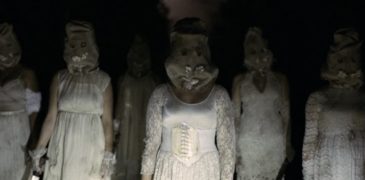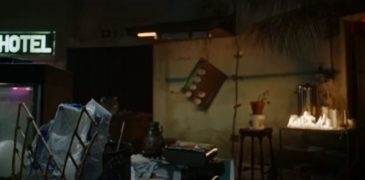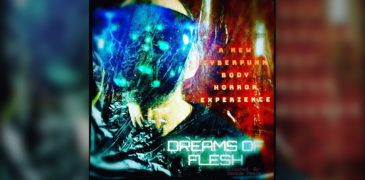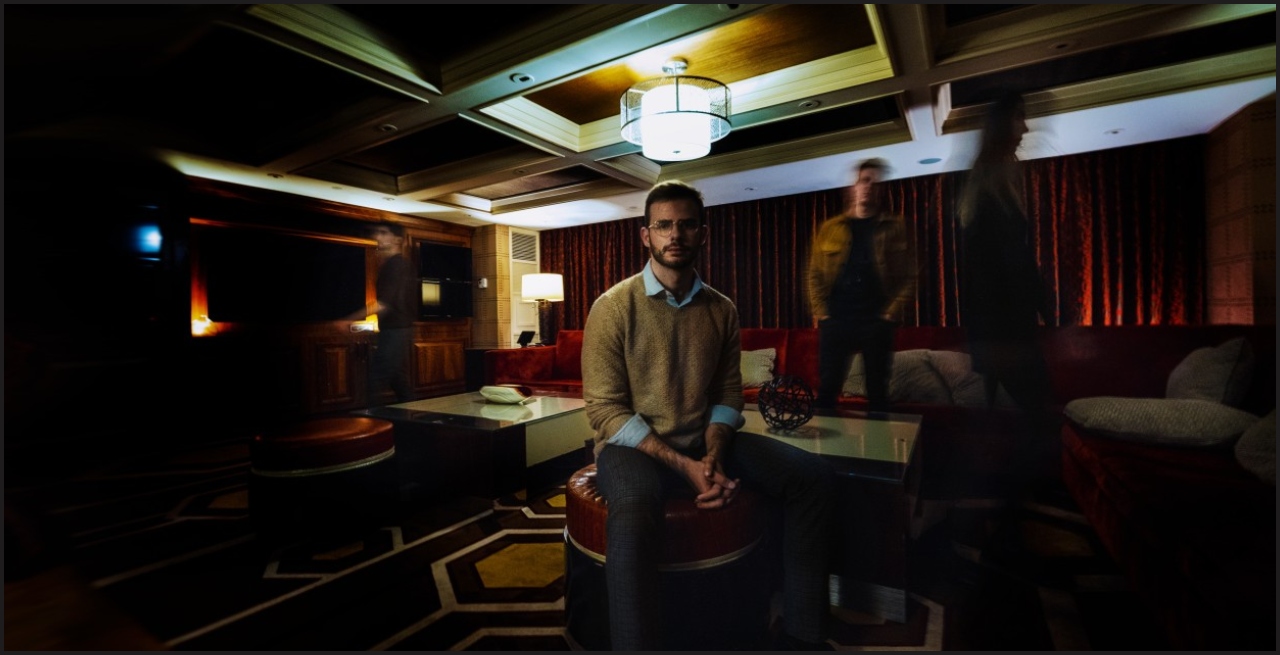
Inspired by a music video, and the estrangement from her own family, J Arcane teamed up with Paul Erskine to direct The Razing, a 2022 film that documents a questionable tradition which brings four estranged school friends back together for a night simmering with resentment and unresolved trauma. The dinner party is set predominantly in Cory’s (Jack Wooton) opulent apartment, bathed in low yellow lighting and high-end furnishings, whilst riddled with anxiety, pills and ominously burnt food.
Our entry into the awkward gathering is via one of the quartet’s plus one, a presumably innocent bystander called Clare, played by Mia Heavner, brought along to bear witness to the barbed comments, hostility, and anxiety ridden bloodletting on show from the very start.
There’s talk of a coming judgment day, and of monstrous acts of immolation in the outside world. Although some of the members of this assumedly wealthy elite refuse to believe the experiences of others, it’s clear that society is the cause of much uncertainty and fear, that this ill-fated meal has everyone in a pensive state of unhappiness. As the evening progresses, a trio of Freudian psyche styled drugs are added to the mix and we see flashbacks to teenage distress, involving the four key party goers, and their previous conflicts and familial trauma.
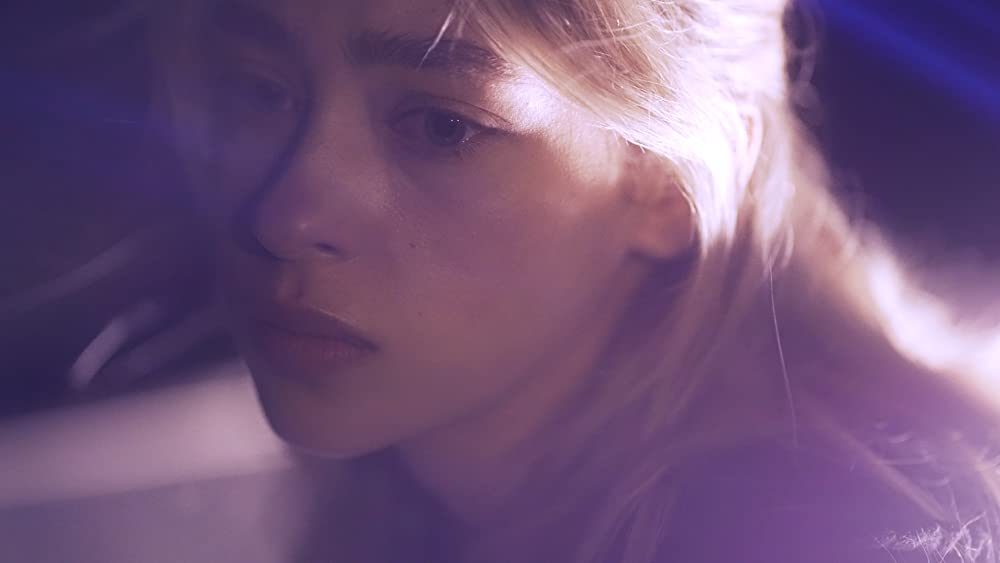
The muted colours and yellow lighting emphasize the affluence and seclusion of the evening, yellow being synonymous with wealth, madness, and illness, while it’s also reflected in the growing pallor of each of the guests. The moody electronic score mixes choral vocalising and remixes classical stringed melodies and piano, successfully bringing in eerie tinnitus ringing and deep heartfelt bass lines exacerbating the woozy uncertainty felt by all. As in the last days of Rome historically or the ball at the centre of Edgar Allen Poe’s Masque of The Red Death, the affluent party as the end draws in around them.
The film is filled with panning shots, changes in focus, and views from between guests or behind furniture, evoking both a voyeuristic feel to proceedings and the sense of watching a computer simulation. The varied camera techniques and continuous editing is heightened by the knowledge that the entire production was shot with only a two-person crew.
Starring a group of relatively unknown actors, the experimental camerawork, slow pacing, and unsettling score help alleviate some of the pressure from the cast who must work with an, at times, very awkward script. The stilted dialogue, however, could be considered to befit the emotionally distant and drug fuelled interactions of the increasingly unhinged protagonists.
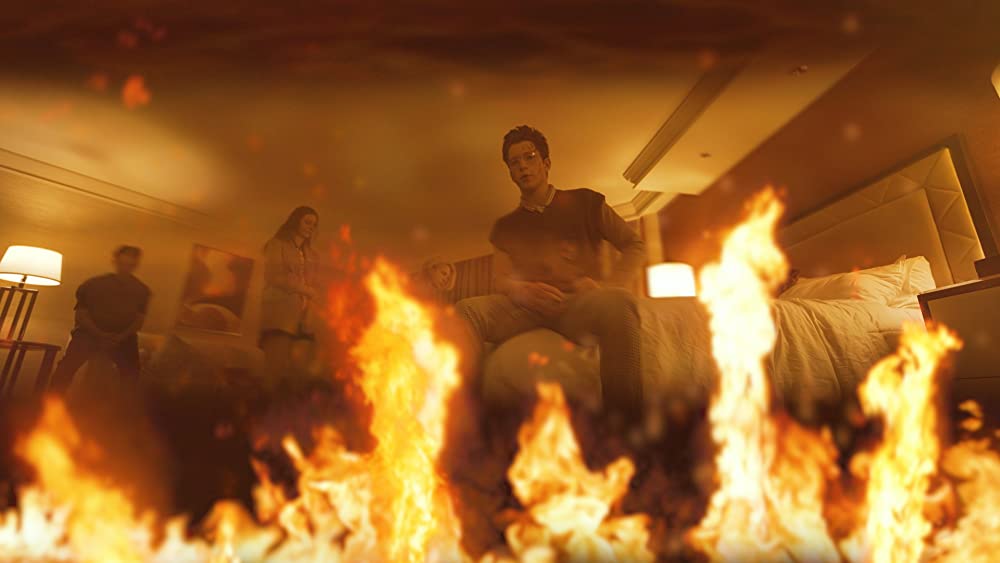
The film attempts to maintain a continued sense of animosity and recrimination, relying heavily on self-important diatribes and unnaturally wordy summations of one another’s character faults. With the party goers being so unlikeable, and all so reticent about anything other than how much they hate one another, or struggle with their past issues, it’s hard for the audience to remain hooked by the central question “Why have these awful people come back together?”.
Overall, The Razing is successful in achieving a woozy, intoxicated sense of uncertainty and of impending retribution, but the pacing and the characters’ confused, and at times, inexplicable behaviour struggles to hold the viewers’ attention, getting lost among the self-indulgent monologues and countless awkward arguments or outbursts.
The Razing is distributed by Gravitas Ventures and will be released on VOD on September 27th, 2022. It is also available for pre-order on Apple TV (late August).
More Film Reviews
M. Night Shyamalan’s Latest is Mediocre Old (2021) is an existential story about a beautifully secluded beach surrounded by rocks that will kill you, eventually. M. Night Shyamalan’s newest release… Exclusive Interview with Emily Hagins, Sorry About the Demon (2022) Shudder and Paper Street Pictures have teamed up with writer/director Emily Hagins again in Sorry About the Demon (2022), a… When Cami orders a taxi service to take her to her father’s country home, she’s hoping for a quiet and uneventful ride. But a wrong turn by Spencer, her chatty… Being mostly an American tradition, fraternities seem to be full of real life horror stories due to the harsh hazing rituals regularly to new pledges. These organisations seem to be… Euro-surrealism at its most mind-assailing, as Dave has inherited his father’s run-down and weird Hotel Poseidon. A dilapidated hellscape where logic is frequently suspended attracts the weirdest of the weird,… Dreams of Flesh is a 2024 sci-fi horror, written and directed by Davide Pesca with additional writing from Fabrizio Pastura. The film is the third and final installment in the…Old (2021) Film Review – Spoiler Free!
Sorry About the Demon (2022) – Film Review and Interview With Emily Hagins
The Toll (2020) Team Review – Whispers of Violence and Despair
Hell Night Film Review – A Hybrid of Slashers and Haunted Houses
Hotel Poseidon (2021) Film Review – A Day in a Life, in a World Where Nothing Makes Sense
Dreams of Flesh (2024) Film Review – VR Therapy


